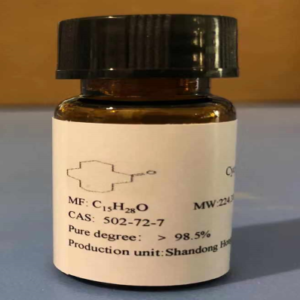While the primary application of cyclopentadecanone lies in the fragrance industry, it may also find use in other areas.
Here are a few additional applications of cyclopentadecanone:
Chemical Intermediates: Cyclopentadecanone can serve as an intermediate compound in the synthesis of various organic chemicals. It can be used as a starting material or precursor in the production of other compounds with desired properties. These intermediates may find applications in pharmaceuticals, agrochemicals, and other industries.
Polymer Additives: Cyclopentadecanone can be utilized as a component in polymer formulations and additives. It may contribute to enhancing the properties of polymers, such as improving their durability, flexibility, or impact resistance. Additionally, it can act as a plasticizer, aiding in the processing and molding of polymers.
Lubricants and Lubricant Additives: Cyclopentadecanone can be employed as a lubricant or a lubricant additive due to its ability to reduce friction and provide surface protection. It may find use in various lubrication applications, such as automotive lubricants, industrial lubricants, and metalworking fluids.
Coatings and Surface Treatments: Cyclopentadecanone can be incorporated into coatings and surface treatments to enhance their performance. It may contribute to improving the adhesion, durability, or chemical resistance of coatings applied to various substrates, including metals, plastics, and textiles.
Research and Development: Cyclopentadecanone, like other organic compounds, can be utilized in research and development activities. It may serve as a building block or reference compound in the synthesis of novel molecules or materials. Researchers may explore its chemical reactivity and properties to discover new applications or develop innovative processes.
It’s important to note that the mentioned applications beyond the fragrance industry are potential uses of cyclopentadecanone based on its properties and characteristics. The actual implementation and commercial viability of these applications may depend on factors such as cost, availability, regulatory considerations, and industry demand.
How does cyclopentadecanone contribute to improving the durability of polymers as a polymer additive?
Cyclopentadecanone can contribute to improving the durability of polymers as a polymer additive through various mechanisms.
Here are a few ways in which cyclopentadecanone can enhance the durability of polymers:
Plasticization: Cyclopentadecanone can act as a plasticizer in polymer formulations. Plasticizers are substances added to polymers to increase their flexibility, elongation, and toughness. By reducing the glass transition temperature (Tg) of the polymer, china Cyclopentadecanone factory cyclopentadecanone enhances its ability to deform under stress without breaking or cracking. This plasticizing effect helps to improve the durability and impact resistance of the polymer.
Friction Reduction: Cyclopentadecanone can reduce friction between polymer surfaces. When used as a lubricant or lubricant additive, it can create a thin lubricating film between polymer components, reducing wear and frictional forces. This friction reduction can prevent the degradation of the polymer due to mechanical stress or abrasion, thereby enhancing its durability.
Chemical Resistance: Cyclopentadecanone can contribute to improving the chemical resistance of polymers. It can form a protective barrier on the polymer surface, reducing its susceptibility to chemical attack, such as degradation caused by exposure to acids, bases, or other reactive substances. By enhancing chemical resistance, cyclopentadecanone helps maintain the structural integrity and durability of the polymer.
Oxidation Stability: Polymers are often susceptible to degradation caused by oxidative processes, such as exposure to oxygen, heat, or light. Cyclopentadecanone can act as an antioxidant, inhibiting the oxidation of the polymer. By scavenging free radicals and reactive oxygen species, it helps to prevent the degradation of the polymer and extends its service life.
Adhesion Promotion: Cyclopentadecanone can improve the adhesion properties of polymers. When used as a surface treatment or incorporated into coatings, it can enhance the bonding between the polymer and other materials, such as substrates or additional layers. This improved adhesion contributes to the durability of the polymer by preventing delamination or detachment of coatings and ensuring long-term performance.
It’s important to note that the specific contribution of cyclopentadecanone to the durability of polymers can vary depending on the polymer type, formulation, processing conditions, and the desired properties. The effectiveness of cyclopentadecanone as a polymer additive should be evaluated through testing and optimization for specific polymer systems and applications.
